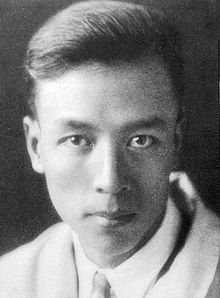Sun Yu (director)
| Sun Yu | |
|---|---|
 |
|
| Background information | |
| Chinese name | 孫瑜 (traditional) |
| Chinese name | 孙瑜 (simplified) |
| Pinyin | Sūn Yú (Mandarin) |
| Born |
March 21, 1900 Chongqing, China |
| Died | July 11, 1990 (aged 90) Shanghai |
| Occupation | Film director |
Sun Yu (March 21, 1900 – July 11, 1990) was a major leftist film director active in the 1930s in Shanghai. One of the core directors of the Lianhua Film Company, Sun Yu made a name for himself with a series of socially conscious dramas in the early to mid-1930s. After the Japanese invasion of China in 1937, Sun Yu made his way to the interior, where he continued to make films glorifying the war effort against the Japanese.
His career took a turn for the worse after the Communist victory in 1949. In The Life of Wu Xun, Sun Yu's big-budget biographical picture of the titular Qing Dynasty educator, Sun attracted the wrath of Mao Zedong, who personally criticized the film in an essay. Though Sun never fully recovered from the episode, he has regained his reputation as one of the foremost filmmakers the golden age of Chinese cinema.
Besides his work in cinemetography, Sun Yu is known as a poet and translator, with 2 translations of Li Po's poems appearing in Poetry magazine in 1926, and a full-length book of selected Li Po poems with translations and commentary appearing in 1982.
Sun Yu was born in the city of Chongqing and educated first at Tsinghua University in Beijing before continuing his education in drama at the University of Wisconsin–Madison.
After taking his degree in 1925, Sun enrolled at the New York Institute of Photography, where his courses included cinematography and film editing. He also took evening courses at Columbia University in screenwriting and other, related courses. During this time he also audited a series of lectures on writing for the theater given by David Belasco which influenced him greatly.
...
Wikipedia
